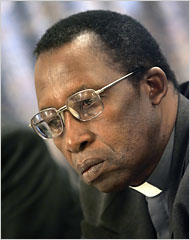By Michael Wines
The New York Times
September 12, 2007
http://www.nytimes.com/2007/09/12/world/africa/12zimbabwe.html?_r=1&ref=africa&oref=slogin
Johannesburg, Sept. 11 — The Zimbabwean cleric and opponent of President Robert G. Mugabe who was accused of adultery after what was apparently a government sex sting said Tuesday that the Vatican had accepted his resignation as archbishop of Bulawayo.
In a written statement, the bishop, Pius Ncube, said he was stepping down "to spare my fellow bishops and the body of the Church any further attacks." The Vatican confirmed the announcement in its own one-sentence statement, citing a church canon that "earnestly" requests the resignation of a bishop "who has become less able to fulfill his office because of ill health or some other grave cause."
Bishop Ncube said he would remain a Catholic bishop. Some of his supporters predicted that his resignation would leave him freer to raise the humanitarian and human rights issues that had become the preoccupation of his work as archbishop in Bulawayo, Zimbabwe's second largest city.
 |
| Bishop Pius Ncube has been among the harshest critics of President Robert G. Mugabe. Photo by Gianluigi Guercia |
But some also expressed surprise that the Vatican so willingly accepted his resignation, which was tendered days after the sexual accusations became public. While the church speaks out regularly on humanitarian issues, they said, it has had relatively little to say about the social and economic collapse in Zimbabwe, whose leader, Mr. Mugabe, is a Catholic.
Some also noted that Catholic priests throughout Africa, some of them in Zimbabwe, have not rigidly adhered to the Vatican's demands of celibacy in the priesthood, and that some have more or less openly maintained sexual relationships and even raised families.
The church has long recognized the spotty record of many African priests in maintaining their vows of celibacy but has yet to deal consistently with the matter. Pope Benedict XVI, however, has strongly opposed most political involvement by priests, though the church itself often takes political stands and exerts pressure on behalf of its beliefs and interests.
Bishop Ncube has been among Mr. Mugabe's harshest critics, saying once that he was prepared to stand on the front lines of protests against his rule, and on another occasion that he was praying for Mr. Mugabe to die so that a successor could end the country's autocracy.
"It would be useful for the Catholic Church itself to make a comment on this," said Selvan Chetty, deputy director of the Solidarity Peace Trust, a South Africa-based group led by Bishop Ncube that promotes human rights in Zimbabwe. "It does seem a little surprising, given all the things going on in Zimbabwe at the moment about which the church has had little to say."
Bishop Ncube has been under siege by Mr. Mugabe's government and its supporters since mid-July, when state-controlled television and newspapers showed secretly taped images that appeared to show him in bed with a woman.
The woman's husband later filed a lawsuit that seeks 20 billion Zimbabwean dollars in damages from Bishop Ncube for adultery. That amount is about $80,000 on Zimbabwe's black market, which has a more realistic exchange rate than the one set by the government. The bishop has said he will defend himself against the charge, but has not addressed accusations that he broke his vow of celibacy except to say that "there are a whole lot of other circumstances that take place in a person's life."
In his statement on Tuesday, Bishop Ncube said he was the target of "a state-driven, vicious attack not just on myself, but by proxy on the Catholic Church."
"It is my feeling that I should face this case in court as Pius Ncube, an individual, not that the Holy Catholic Church of God should seem to be on trial because I am its head," he stated. "I know that there will be many of you who will be bitterly disappointed at my leaving my post as archbishop of Bulawayo — and a few who will be delighted, seeing their mission as having been accomplished."
The bishop said that he would continue to speak out on Zimbabwe's political and social crisis, and one person close to him said that he planned to lead a new organization dedicated to raising public awareness of Zimbabwe's problems. Mr. Chetty said that that was an option, but that no decision has been made.
Most of Bishop Ncube's supporters seemed to view the sexual accusations as a personal matter unrelated to politics and human rights.
"I don't think it will have much of an effect," said Lovemore Madhuku, who leads the National Constitutional Assembly, a group of pro-democracy organizations that is based in Harare, Zimbabwe's capital. "Most of us see what happened to Pius as a personal misfortune. There's no reason why he couldn't continue to remain a prominent advocate."
Any original material on these pages is copyright © BishopAccountability.org 2004. Reproduce freely with attribution.